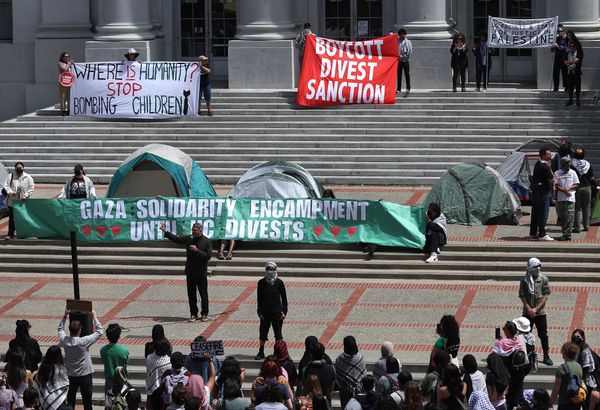
Heard the latest about the No campaign’s tactics? It’s using fear and doubt, rather than facts. But the Yes campaign wants to reignite its campaign after this week. Polling shows what a struggle the Yes campaign faces. The Yes campaign has to build on the Farnsy buzz, says one newspaper. But polling experts say the Yes campaign is already lost.
How are the leaders performing? Yes advocate Marcia Langton has hit back after being verballed by News Corp, which tried to claim she had called No voters “racist and stupid”, when her remarks were (correctly) directed at the arguments put forward by the No campaign. Previously, No campaign leaders such as Warren Mundine have had their own problems, with demands that they distance themselves from the more overtly racist members of their own side.
Sound familiar? It’s exactly like an election campaign. For the media, the Voice to Parliament resembles an extra federal election, held halfway between the normal three yearly ones, with all the polling, election advertising (extra money for the media!), campaign trail stories, fake equivalences, News Corp lies and hot takes of the real thing.
Except, the media is making a category error. A general election involves an array of parties, individual local candidates in geographically based seats, party leaders, preferential voting and competing policy offerings covering every issue that politicians believe is of importance. And voters must make an assessment of the past performance of the incumbent as well as a prediction of future performance.
A referendum has none of these. It is a single question about a specific issue, with no personalities, candidates, policy platforms, preference distributions or past performance. An election campaign requires voters to assemble a composite position based on all those factors. A referendum is the stripping away of everything else, the removal of every compounding factor. It’s pure democracy: Yes or No (or, if you’re Peter Dutton, Yes or No/Yes-No).
The emerging narrative of this referendum is that it will fail because the Yes campaign — and particularly the Albanese government — did not campaign effectively, allowing the No campaign to sow doubt in voters’ minds. Allied to this is the complaint from Yes supporters that the media is skewing things through its willingness to provide false equivalence and spread disinformation.
But this removes all agency from voters. If the referendum outcome is purely the result of how one group of advocates, and their media supporters, outperformed another, the electorate is let off the hook. Such an argument makes more sense in the context of an election campaign, when all of the factors listed above become crucial aspects of overall campaigns and the sales pitches of major parties. It makes little sense in a referendum.
Ah, but the media object, the Voice is complicated, involving the recognition of First Peoples, improving policy aimed at Indigenous welfare, and parliamentary process. Except, it’s not complex, not to anyone who has made an effort to comprehend the case for genuine recognition in a form on which First Peoples have been consulted, and the need for a fundamental incorporation of the voices of First Peoples in policymaking in order to close the gap.
Many voters haven’t made that effort, the media would counter, which is why the No campaign is succeeding.
But disengagement by voters at this point reflects a deliberate choice. There can be no accidental or natural state of ignorance on the part of voters on October 14 — to insist otherwise is, again, to remove all agency from voters in a democracy. Remaining ignorant, disengaged, electing to be confused, fearful of the unknown, represents a deliberate choice.
In dismissing the agency of voters, the media are, in their own way, rejecting the democratic outcome on October 14. But the electorate will have spoken — not from a position of accidental disengagement from which the Yes campaign failed to shift it, but from a clear choice. To state the seemingly obvious, if the referendum fails, it will be because voters rejected it.
The implications of this are uncomfortable for the media. Voters rejecting a Voice to Parliament will say something explicit about Australians — that they care neither about being the only colonial settler society in the world that doesn’t recognise the Indigenous peoples dispossessed in the creation of their society, nor about making a substantive effort to close the gap in health, educational and economic outcomes for First Peoples.
To suggest that this reflects an innate racism on the part of voters — as Langton did not, but which she is accused of doing — is more a word game than analysis. It speaks for itself. The rest of the world can judge Australians by these two clear signals a No vote will send.
And this is the context for what appears to be a point of agreement between the Yes and No camps: that division (of which they accuse each other) and polarisation are evils to be avoided. After all, however much the right in Australia mimics the Trump Republicans, everyone agrees the kind of polarisation on display in the United States is undesirable. Whatever the outcome of the referendum, we should avoid division.
Except, division and polarisation are contextual states. What if a substantial proportion of the population holds a genuinely malicious view? Is being polarised from them, wanting nothing to do with them, judging them for holding that view, automatically wrong? Should one instead embrace them in spite of their abhorrent views, dismissing those views as just banal political disagreement?
The latter is a kind of lie: it papers over real malice with avuncular “we’re all in this together” tissue, because division is so awful. But a No vote, signalling as it would that Australians like their colonial settler society in just the dispossessive, exclusionary and genocidal form it has been for 240 years, and have no interest in addressing the toxic disadvantage of First Peoples, would provide clarity about the kind of people we really are, however uncomfortable it may be. That clarity about our true nature is to be welcomed, and not obscured with lamentations of “division”, or blaming inept campaign strategists.
Would a failure of the Voice be the result of any individual campaign? Let us know by writing to letters@crikey.com.au. Please include your full name to be considered for publication. We reserve the right to edit for length and clarity.







